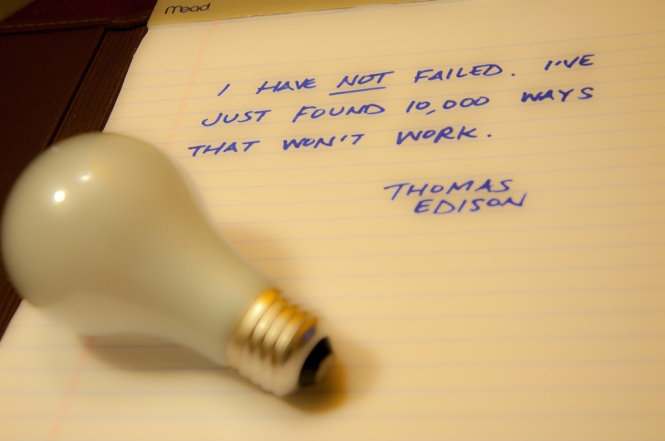No one likes it, no one looks for it. But if you don’t fail, you don’t learn. Part of the problem is that we’re taught that success is what matters most, we applaud achievements, we laud those who get things done. We hear about the time when everything works, but we rarely consider what happened in order to get there.
Any scientist will go through countless fruitless experiments before they hit the right formula. Thomas Edison is the person most frequently cited in this context: “I haven’t failed,” he said about his attempts to invent the light bulb, “I’ve just found 10,000 ways that don’t work”.
Likewise we perhaps know in the back of our mind the stories of people who took numerous setbacks on their way to whatever it is that means we know of them now. JK Rowling was rejected by many publishers, George Washington lost five of his first seven battles. It is because of their success that we know their names, but it is due to their failures they were able to achieve what they did.
My personal favourite is a man who we today remember for his success. His family was forced from their property when he was 7, his mother died two years later. Aged 22 he failed in business, ran for the state legislature the next year and lost, then lost his job and failed to get into law school. At 26 he was engaged to be married for his fiancé to then die. He had a nervous breakdown and spent six months in bed. After getting into the state legislature he tried to become Speaker but lost. Aged 34 he ran for congress and lost, ran again a few years later and won, only to lose his seat two years after that. When he was 45 he ran for the senate, but lost. A couple of years later sought the nomination to the vice presidency, but received less than 100 votes. Two years after that at 49 tried again to become a senator and failed. Aged 51 in 1860 Abraham Lincoln became president of the United States.
Failure is more than a bad thing that might happen. It is inevitable and it is essential, it’s the thing that pushes us forward, if it was easy where would the challenge be? Handling failure is at the heart of developing character, but character is more than just being stubborn. It’s not in our natural instinct to do a lot of the things that we need to do to build our character, we are not always diligent, we’re not always charitable, not always slow to anger or quick to love.
We need something to change, to switch our mind set. Paul writes Romans 12: “Do not conform to the pattern of this world, but be transformed by the renewing of your mind. Then you will be able to test and approve what God’s will is – his good, pleasing and perfect will.”
As Tom Wright says in Virtue Reborn: “Many people expect that virtue will happen to them automatically simply because they take part in the practices discussed here. But the practices aren’t like prescribed medicine that will cure you whether or not you understand how it works. The key to virtue lies precisely, as we have seen, in the transformation of the mind.”
Failure drives us forward when we have an idea of what we want to achieve. Failure tells us that we haven’t made it. But for that failure to prompt us to press forward we have to have a clear idea of what we are striving for. David Brooks, in his book Road to Character, looks at a series of people who throughout history have paid attention to the development of character over and above personal achievement – some of whom went on to achieve quite incredible things. It’s an illuminating book, and one which inspires the reader to prioritise eulogy virtues, the things we want to be remembered for, over resume virtues, the things we put on our CV. But it’s also a book with a hole at its core. Brooks sometimes alludes to the belief systems that provoke people to develop good character, yet he views them really as only a prompt towards a stoic almost Churchillian never-give-in attitude. This sort of attitude is crucial in many circumstances, in fact I’m in the middle of a new biography of Churchill which focuses on the role of his Christian motivation, but it isn’t enough.
If recalcitrant obstinacy is all that drive us forward, the thing which is our goal will become all consuming, failure will hurt each time it comes and success will be the end of the road – even if it is an end with a stunning panorama. But if the thing we aim for is only ever the second most important thing, we will keep perspective: when we fail it won’t be the end of the world, when we succeed we will continue to look beyond.
That’s why prioritising the growth of character is crucial but not for its own sake. We don’t act with integrity so at our funeral someone will eulogise about our honesty. We don’t prioritise relationships just so we are remembered as a great father, husband, brother and friend, as though the remembrance is what matters most. Building character can become just another thing which we strive to achieve. Without a perspective that stretches beyond our own accomplishments and failures character can become about making me into the best me. And that distorts the heart of good character. Character requires failure, and for that failure to mean something it needs a goal which is above and beyond us all.
